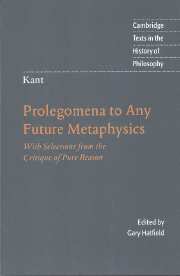Book contents
- Frontmatter
- Contents
- Acknowledgments
- Introduction
- Chronology
- Further reading
- Note on texts and translation
- Prolegomena to Any Future Metaphysics
- Selections from the Critique of Pure Reason
- Table of Contents for the Critique
- From the Preface to the Second Edition
- From the Introduction
- From the Transcendental Aesthetic
- From the Transcendental Logic, Introduction
- From the Transcendental Logic, First Division, Analytic
- From the Transcendental Logic, Second Division, Dialectic
- From the Transcendental Doctrine of Method
- Index
- Cambridge texts in the history of philosophy
From the Transcendental Doctrine of Method
Published online by Cambridge University Press: 05 June 2012
- Frontmatter
- Contents
- Acknowledgments
- Introduction
- Chronology
- Further reading
- Note on texts and translation
- Prolegomena to Any Future Metaphysics
- Selections from the Critique of Pure Reason
- Table of Contents for the Critique
- From the Preface to the Second Edition
- From the Introduction
- From the Transcendental Aesthetic
- From the Transcendental Logic, Introduction
- From the Transcendental Logic, First Division, Analytic
- From the Transcendental Logic, Second Division, Dialectic
- From the Transcendental Doctrine of Method
- Index
- Cambridge texts in the history of philosophy
Summary
First section
The discipline of pure reason in its dogmatic use
Mathematics provides the brightest example of pure reason augmenting itself successfully by itself, without any help from experience. Examples are contagious, especially to one and the same faculty, which naturally flatters itself that it will have the very same luck in other cases as has come its way in the one case. Hence, pure reason hopes to be able to extend itself just as successfully and well-foundedly in its transcendental use as it has managed to do in its mathematical use, especially if it uses the same method in the former case as has been of such manifest benefit in the latter. It is therefore very important for us to know: whether the method for achieving apodictic certainty that one calls mathematical in the latter science is the same as the method by which one seeks to achieve the same kind of certainty in philosophy, and which would in that field have to be called dogmatic.
Philosophical cognition is cognition through reason from concepts; mathematical cognition is cognition through reason from the construction of concepts. To construct a concept means, however: to exhibit a priori the intuition corresponding to it. For the construction of a concept, then, a nonempirical intuition is required, which therefore, as intuition, is a single object, but which, as the construction of a concept (a universal representation), must nonetheless express (in the representation) universal validity for all possible intuitions belonging under that same concept.
- Type
- Chapter
- Information
- Kant: Prolegomena to Any Future MetaphysicsWith Selections from the Critique of Pure Reason, pp. 178 - 180Publisher: Cambridge University PressPrint publication year: 1997

